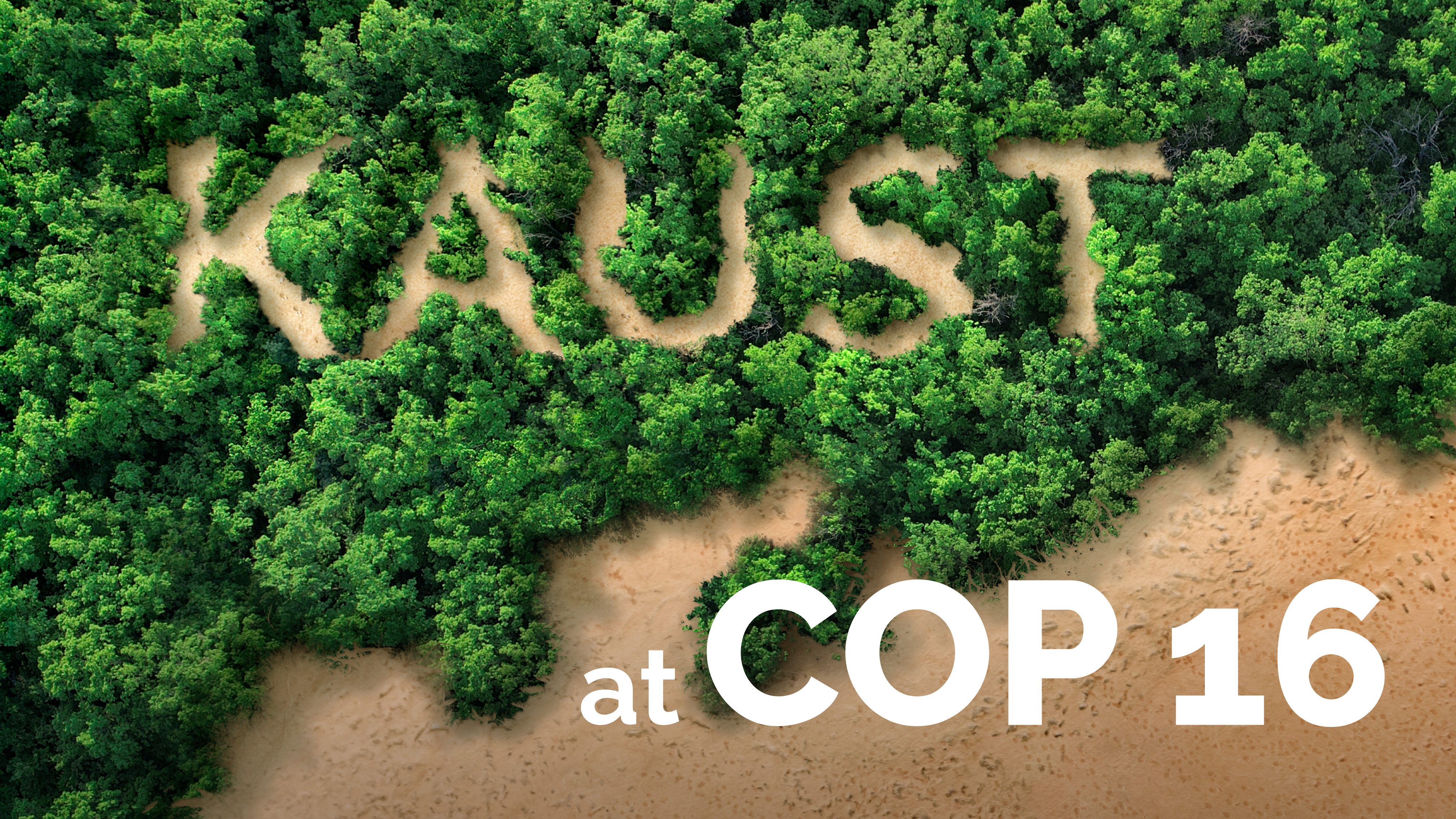KAUST showcases its sustainability innovations at COP16

King Abdullah University of Science and Technology (KAUST) is redefining the role of land as a crucial tool in combating climate change and habitat reduction. Through groundbreaking research, strategic partnerships and inspiring youth outreach, KAUST was a standout participant at the 16th Conference of the Parties (COP16) to the Convention to Combat Desertification (UNCCD), December 2-13, in Riyadh.
The University played a pivotal role during the conference, seeing more than 30 KAUST faculty and experts engaging with stakeholders from 197 nations, tackling land degradation and conservation challenges, and leading the essential conversation on biodiversity. At COP16, KAUST signed significant agreements to drive progress and collaboration in sustainability, addressing critical environmental issues by advancing strategic initiatives.
Notably, KAUST and the Ministry of Environment, Water and Agriculture (MEWA) announced the launch of a new international water-research center to be headquartered at KAUST — a significant initiative for ensuring safe and sustainable water resources for generations to come.
Throughout the conference, KAUST unveiled innovative technologies and revolutionary ideas, demonstrating its renowned expertise and ongoing commitment to advancing Saudi Arabia’s data-driven “green” efforts beyond 2030 while addressing the most urgent environmental challenges facing humanity.
Partnerships and collaboration
KAUST and the Ministry of Energy announced a collaboration to deploy Cryogenic Carbon Capture at Saudi Electricity Company’s Duba Green Power Plant. Professor William Roberts outlined the technology.
In partnership with Aeon, KAUST launched a policy briefing outlining a framework to halve degraded land by 2050, guiding sustainable land management in Saudi Arabia, outlined by Professor Fernando Maestre.
KAUST, the National Livestock and Fisheries Development Program (NLFDP) and the National Research and Development Center for Sustainable Agriculture (Estidamah) agreed to collaborate on producing algae-based biostimulants to enhance soil health and support sustainable agriculture in Saudi Arabia.
KAUST and the National Center for Wildlife (NCW) have partnered to enhance biodiversity conservation, ecosystem monitoring, and public awareness.
The National Center for Palm and Dates (NCPD) and KAUST entered a SAR100 million agreedate-palm sectorment for KAUST to undertake a series of date-palm sector research projects, driving innovation and development in a high-priority field.
Professor Matthew McCabe discussed the role of Earth observation in tackling land degradation and the loss of biodiversity. He highlighted a KAUST dashboard prototype developed with the Aeon Collective, Planet Labs PBC and the University of Copenhagen.
Academic research and excellence
Professor Yoshihide Wada addressed Saudi Arabia’s water future, emphasizing water-supply planning, food trade and water security at the COP16 Food and Agriculture Pavilion.
Professor Georgiy Stenchikov spoke on the effects of dust storms on society, outlining the impacts on humans and environmental systems, and highlighting mitigation opportunities.
The Research, Development and Innovation Authority (RDIA) recognized Professor Mark Tester, Chair of the KAUST Center of Excellence for Sustainable Food Security, and KAUST Professor NorEddine Ghaffour, researcher into low-energy desalination technologies, for their impactful work in sustainability.
Tester presented KAUST’s development of heat- and- salt-resistant crops for food security in arid regions — a key Saudi Vision 2030 initiative.
Professor Sami Al-Ghamdi illustrated how green infrastructure can combat desertification and enhance sustainability in arid cities.
Maestre spoke on regenerative agriculture in the MENAT region and joined McCabe and the National Center for Vegetation Cover and Combatting Desertification (NCVC) and MEWA on a panel addressing land degradation in hyper-arid areas.
Dr. Cristina Andrés Barrao, Lab Genetics Research Scientist of the KAUST Algae Program, delivered a keynote titled “Impact of Spirulina-Delivered Biostimulant Treatment on the Soil Microbiome Composition of Date Palm Under Arid Conditions.”
Professor Pascal Saikaly, Environmental Science and Engineering, participated in a panel discussion titled “R&D to Commercialization in Water and Agriculture” and presented a case study regarding innovative wastewater treatment.
Associate Professor Raquel Peixoto, Marine Science, presented on “Connecting Seas, Land and People for Planetary Repair.”
Innovation
Professor Himanshu Mishra, co-founder of Terraxy, presented the KAUST startup company’s CarboSoil and SandX innovative solutions — technologies to combat desertification and restore degraded lands.
Professor Peiying Hong highlighted KAUST’s water reuse innovations with the Saudi Irrigation Organization, supporting Saudi Vision 2030 water sustainability goals.
KAUST startups Terraxy, Edama, Sadeem and iyris were featured during a COP16 panel on startups tackling desertification, land degradation and drought, highlighting the role of KAUST entrepreneurs and the National Technology Institute’s (NTI) role in supporting sustainable solutions.
Professor Rod Wing, Plant Science, presented on the Wadi Qadid Experiment Station and the KSA Native Genome Project — two complementary approaches to greening the road from Makkah to Medina.
Community engagement
During AgriFood Systems Day, President Sir Edward Byrne AC and Professor Carlos Duarte emphasized integrated solutions to address climate change, biodiversity loss and land degradation.
Sir Edward delivered a keynote, “Shaping Sustainable Futures,” and participated in a KAUST-Aeon panel with Aeon’s HH Princess Noura bint Turki Al-Saud A-Saud and HH Princess Mashael bint Saud Al-Shalan, as well as KAUST Professors Fernando Maestre and Duarte, focusing on climate, biodiversity and land degradation alignment.
Giulio Brizzi, a marine ecologist with KAUST Beacon Development (KBD), delivered a keynote address titled “Marine Aquaculture Impact Assessment: New Technology Application for Saudi Arabia’s Red Sea.”
TKS students explored Professor Salim Al-Babili’s research, showcasing critical thinking and curiosity, demonstrating why youth engagement matters in science and advancing restoration efforts.
KAUST Professor Imed Gallouzi joined Aeon’s Princess Mashael and other researchers to call for urgent action on land degradation, air quality and human health, showcasing KAUST’s contributions.

